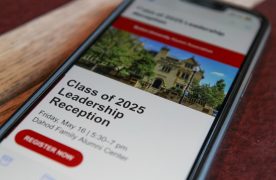For the average student, the Boston University administration has done a passable job of immediately responding to the coronavirus. The majority of the student body has been kept off campus. Academic instruction has not been suspended and continues, albeit to a limited degree, on the video conference platform Zoom. The most urgent matters of consequence, at least for a higher education institution, seem to have been expeditiously addressed.
But one of BU’s actions, or lack thereof rather, calls into question the administration’s underlying incentive for addressing coronavirus in this particular way. There are currently three confirmed cases on campus. Although these individuals are now isolated, their current locations and where they have been on campus are unknown. By extension, who on campus they could have come in contact with and infected is also unknown.
That lack of information is especially terrifying for the students who rushed back to campus last week to retrieve their belongings. This same omission has been particularly damning for the Trump administration’s response to coronavirus, why would it not apply to them? As these students remain in close quarters and interact with family members, they cannot know until two weeks after they have returned to BU whether or not they themselves are ill and have spread it to their loved ones.
In light of the unclear moving out instructions, the probability of having crossed paths with one of the infected persons is likely much higher than expected. Unfortunately, President Robert Brown’s lack of official correspondence here does not just have a salient effect on these students and their families.
Some students could become homeless, lose consistent access to food and altogether halt their learning because of this major transition. Some may have to return to toxic homes.
Service workers on campus may lose their families’ sole source of income as university operations shut down. And for the average student, we have lost many of the benefits only in-person learning can provide: productivity, motivation and a sense of purpose. The BU community’s welfare itself has been devastated by, what is effectively, the institution’s closure — one that was meant to protect us. Now that this measure has partially failed, we deserve to be made aware of the fact.
Not only that, we deserve an admission of error beyond the reporting of the pseudo-public relations machine of BU Today. This is a matter of safety during an unprecedented health crisis that the U.S. healthcare system is not equipped to handle. Why are we not receiving complete transparency about this issue so that we can do our own parts to protect ourselves and at-risk individuals?
The entire community has been late in receiving this vital information, putting the students who have appealed to stay on campus and the remaining staff at risk. Providing them with, at the very least, the locations of these confirmed cases would be an extra step of precaution that may protect against further spread. The silence thus far only strengthens suspicions that there is no plan in place to protect these vulnerable populations.
Perhaps the administration is trying to buy time to limit institutional liability. But, we have gone far past that point. In fact, it should no longer be of concern. BU and other universities are not prepared for pandemics, and should not be expected to be.
However, the fact that BU is not built for this purpose does not excuse the administration from doing everything within its power to contain the damage — actions that cannot exclude a note from President Brown about these confirmed cases.
Again, the problem here is not confined to the measures taken to mitigate potential widespread contagion. Rather, it is insufficient to quarantine these infected individuals and deem that a holistic response when the entire community has shouldered the burden. There has been a serious lack of coordination among all departments, subsequently leaving students, parents and members of the university in the dark.
The curtain has been pulled back on faltering bureaucracies in all of higher education, not just BU.
No one has a full picture of the administration’s plan of action, and that has been the perfect breeding ground for confusion and rumors. Students still have little idea about their tuition and financial aid, their belongings, their grades, their commencements and more.
To a certain extent, the uncoordinated university response is understandable. BU is an extremely large school and this is unprecedented. But at a time like this when the world itself feels like it is coming apart at the seams, providing a clear explanation of the consequences on our lives as students is the least the administration can do. We need unified action, and the efforts so far have demonstrated that the university’s infrastructure is structured against that goal.













